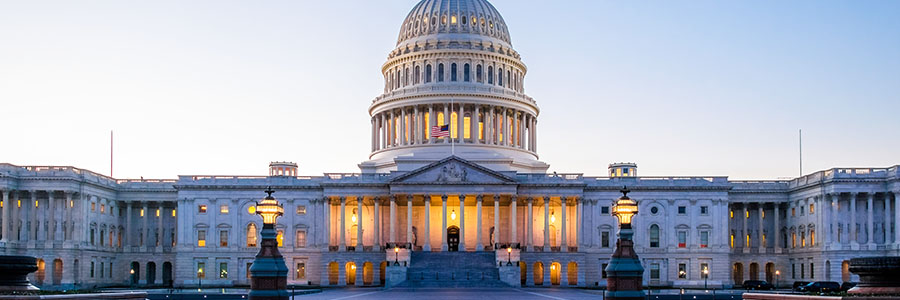Host: Chris Krueger, Managing Director, Washington Research Group - Macro, Trade, Fiscal & Tax Policy, TD Cowen
In this episode, TD Cowen Washington Research Group’s Chris Krueger discusses the top four big-picture signals to watch in the 2024 noise; the Presidential election, US$5 trillion+ tax/fiscal cliffs on the horizon, the Congressional undercard, and the macro policies of both presidential candidates.
This podcast was originally recorded on September 16, 2024.
Speaker 1:
Welcome to TD Cowen Insights, a space that brings leading thinkers together to share insights and ideas shaping the world around us. Join us as we converse with the top minds who are influencing our global sectors.
Chris Krueger:
Good morning. Welcome back to TD Cowen's Street Cred. I am Chris Krueger with TD Cowen's Washington Research Group, and we'll attempt to translate K Street to Wall Street faster than a speeding Acela, and even faster if you juice up the playback. Apologies for the delay. Since June, the pod's went stale inside of a day given the amount of insane news coverage. In the final seven weeks of the 2024 campaign, we will be posting an election pod every Tuesday. But it is 2024, so expect the unexpected. Okay, we wanted to focus this one a bit more on the policy implications of the election since those are at least relatively consistent and known. Okay, the presidential election, look, no shocker here, we're in completely unprecedented times. We're essentially in our first snap election.
The presidential election is going to come down to two regions across seven states. You've got four across the Sun Belt of Arizona, Georgia, North Carolina, and Nevada, and then the Rust Belt Trio of Michigan, Pennsylvania, and Wisconsin. Post debate, this is really a sprint. We see Harris having a lot of the momentum, but again, expect the unexpected. Voting is underway. Reminder, November 5th is election day, but that's when voting ends. 80% of the vote could be in before election day, so start thinking more about September surprises as opposed to October surprises. Okay, second point. Just taking a giant step forward, we've got $5 trillion in debt, fiscal, and tax cliffs to deal with next year. Much of 2025 fiscal policy is going to be dictated by two events. These are going to be dictated by the congressional majorities and the margins. Number one, we've got the debt ceiling returning next summer as early as June, maybe as late as September. And then number two, we've got the expiration or the sun setting of all the 2017 Tax Cuts and Jobs Act, individual rates and changes at the end of next year.
You also have the expiration of the Obamacare subsidies. Of note that 21% corporate rate does not snap back to the 35% Obama era level like the individual rates. Although should Harris win, we would expect a conversation on an increase in the corporate rate, perhaps up to 25%. Okay, number three, the Congressional undercard. Why is this important? Like we just said, the majorities and the margins are going to shape and help dictate what happens with fiscal and tax policy next year. Margins are likely to remain historically close, senate likely goes Republican, House likely goes democratic, although we're probably talking inside of a handful of seats in either direction. I think it's interesting just to look back in 10 of the last 12 elections. Going back to 2000, there's been a change in control of the House Senate, and or White House, every election except for 2004 and 2012. And that trend is likely to continue potentially with an exclamation point, as the House and the Senate are tracking to flip to opposite parties for the first time in American history in the same election.
The margins in Congress really reflective of how divided and regionalized we are as a country. It's a 51 49 Senate majority, and 220 to 211 in the House with a handful of vacancies. And again, taking a step back, the 2020 election decided by fewer than 43,000 combined votes in Arizona, Georgia, Wisconsin, the margin even closer in the midterms, fewer than 12,000 combined votes in five districts flipped the House. Spoiler alert, we would be surprised if Senate and House majorities were known on election night, expect long counts and maybe recounts, party switching and or cabinet positions could further alter Senate margins and perhaps the majority. Okay, fourth and final area to cover. Policy. I think what's important to note here is that a lot of what Trump is highlighting can be done without Congress. But on tax and fiscal, the majorities and the margins in the House and Senate are critical.
Going with a potential Trump win, think big picture, the pick of JD Vance's VP really underscores our key theme on a potential second Trump term. And that is that unlike that first Trump cabinet, second term Trump likely all gas no break would also note that the Supreme Court very different from the first term. Three big kind of macro policy areas to flag, first on taxes, they likely stay where they are, if not cut further. Huge distinction between Harris and Trump. Within that tax fiscal bucket though, both Trump and Vance opposed to any entitlement cuts. Trump has also discussed increasing defense spend, there's a current plan among Senate Republicans to increase defense spending up to 5% of GDP, essentially doubling what is already a trillion dollar ballpark. So extending all of the current tax rates, if not cut further, so taxes stay low, although deficits up into the right. With trade, this is very much a narrative of protectionism and competition with China.
When you think about industrial policy, factory North America is very bipartisan and it has a growing moat. On tariffs, the two big ones, the first is a 10% baseline tariff. Trump recently has also floated that this could be as high as 20%. This is essentially the border tax that Trump talked about in 2016 and 2017. I think important to note that this can be implemented unilaterally, you do not need Congress for this. The second big one is the repeal of permanent normal trade relations with China. This would effectively increase the current tariff average on Chinese goods from 19% to 61%. You do need Congress to repeal permanent normal trade relations. If the votes in Congress were not there, Trump could just unilaterally increase those tariffs. Third and final area to flag on Trump potential policies in the second term is immigration. Potentially broadest impact to the labor market would be the stated goal of the largest deportation effort in U.S history.
Migration Policy Institute ballparks the number of undocumented individuals in the U.S. around 11 million. In theory, this could be accomplished by the Insurrection Act of 1807, allowing the president to deploy the military to assist authorities with law enforcement. There's been significant pushback from Blue State Governors on this theory and policy, although I think there are also some real sort of just logistical questions around this, but it remains Trump's stated policy and something that he speaks on pretty regularly. Okay. Potential Harris administration policies, keep in mind with the Senate likely Republican that all of Harris's cabinet regulators, et cetera, will have to go through the Senate Republican gauntlet, and so there is sort of a 'hedge' on policy from the Senate, although Senate is really going to come down to a handful of states, so keep an eye on, again, the margins and the majority in the Senate.
Number one, though, taxes very likely going up should Harris win. We suspect Harris and her VP, Tim Walz would push for a year end tax deal, that would see increases on tax rates for those making above 400,000 or 800,000 as a household reminder. With that sunset, the top rate goes from 37% to 39.6%. SALT, the ability to deduct state and local tax is going to be a huge question. Would you might see something like a doubling of the current cap of 10,000 to 20,000, but probably only for those under that top income threshold. Corporate rate hike, definitely in play. Harris has followed Biden's policy of an increase to 28%. That's probably too high given Senate Republicans and just again, the margins in Congress, but something like 25% could be in play. One area where we would expect a real focus would be on the child tax credit so, an expanded and refundable child tax credit, a big priority for both Harris and Walsh in the year-end tax package. Think of that as sort of lower income stimulus.
Second would be the Inflation Reduction Act being de-risked. This is sort of probably the biggest investment implication of a Harris-Win, is that that trillion plus in green energy tax credits from the IRA is de-risked. There's a lot of fear among investors of a repeal of that in a Republican sweep. I think that's mispriced, and that a Harris-Win, the shovels and capital can go into the ground across the board. Okay, I think we kept it to just under 10 minutes. That's a wrap. This has Ben Chris Krueger with TD Cowen's Washington Research Group for Street Cred.
Speaker 1:
Thanks for joining us. Stay tuned for the next episode of TD Cowen Insights.
This podcast should not be copied, distributed, published or reproduced, in whole or in part. The information contained in this recording was obtained from publicly available sources, has not been independently verified by TD Securities, may not be current, and TD Securities has no obligation to provide any updates or changes. All price references and market forecasts are as of the date of recording. The views and opinions expressed in this podcast are not necessarily those of TD Securities and may differ from the views and opinions of other departments or divisions of TD Securities and its affiliates. TD Securities is not providing any financial, economic, legal, accounting, or tax advice or recommendations in this podcast. The information contained in this podcast does not constitute investment advice or an offer to buy or sell securities or any other product and should not be relied upon to evaluate any potential transaction. Neither TD Securities nor any of its affiliates makes any representation or warranty, express or implied, as to the accuracy or completeness of the statements or any information contained in this podcast and any liability therefore (including in respect of direct, indirect or consequential loss or damage) is expressly disclaimed.

Managing Director, Washington Research Group - Macro, Trade, Fiscal & Tax Policy Analyst, TD Cowen

Chris Krueger
Managing Director, Washington Research Group - Macro, Trade, Fiscal & Tax Policy Analyst, TD Cowen

Chris Krueger
Managing Director, Washington Research Group - Macro, Trade, Fiscal & Tax Policy Analyst, TD Cowen
Chris Krueger joined TD Cowen Washington Research Group in August 2016 as the Washington Strategist. Mr. Krueger and the TD Cowen Washington Research Group were recently named #2 in the Institutional Investor Washington Strategy category, where he had been consistently ranked for the past decade along with WRG. Mr. Krueger publishes the DC Download, a must-read daily for Wall Street portfolio managers who want a quick look at the top Washington stories and their impact on the capital markets. Mr. Krueger covers DC macro, fiscal, tax and trade policy.
He held similar positions at Guggenheim Securities, MF Global, Concept Capital, and Potomac Research Group. Earlier he worked for nearly four years on the senior staff of the House of Representatives. He has also worked on several local, state, and federal political campaigns across the country.
Mr. Krueger holds a BA from the University of Vermont and an MA in international relations from King’s College London. He appears frequently on CNBC and Bloomberg and is widely quoted in The Wall Street Journal, FT, Axios, New York Times, Washington Post, and POLITICO. He also speaks regularly at industry events and conferences, including the Milken Institute Global Conference, National Organization of Investment Professionals, and the New York Stock Exchange.
Material prepared by the TD Cowen Washington Research Group is intended as commentary on political, economic, or market conditions and is not intended as a research report as defined by applicable regulation.







